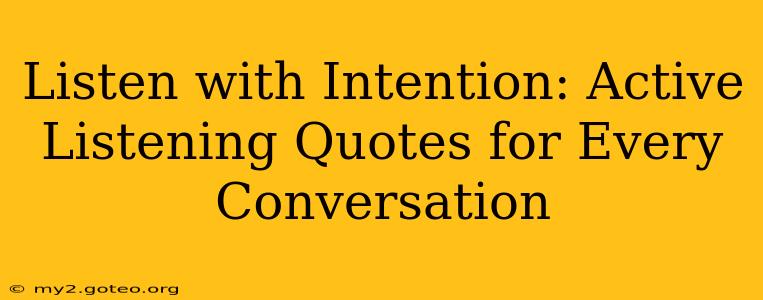In today's fast-paced world, truly listening—actively listening—is a rare and valuable skill. It's more than just hearing words; it's about understanding the speaker's message, both verbal and nonverbal, and responding thoughtfully. This ability to connect deeply with others fosters stronger relationships, improves communication, and ultimately leads to more fulfilling interactions. This post delves into the power of active listening, explores insightful quotes that highlight its importance, and offers practical tips for incorporating this skill into your daily conversations.
Why is Active Listening Important?
Active listening isn't merely polite; it's a foundational element of effective communication. When you listen attentively, you demonstrate respect for the speaker and their perspective. This fosters trust and strengthens the bond between you. Furthermore, active listening allows you to grasp the nuances of a conversation, leading to better understanding, clearer problem-solving, and more meaningful connections. Ignoring or superficially listening can lead to misunderstandings, conflict, and missed opportunities.
Inspiring Quotes on Active Listening
Here are some powerful quotes that encapsulate the essence of active listening and its impact:
-
"The most basic of all human needs is the need to understand and be understood." - Ralph Nichols This quote highlights the fundamental human desire for connection and validation, achievable through genuine listening.
-
"Listening is a magnetic and creative force." - Frank Tyger This emphasizes the powerful, transformative effect of truly listening, opening doors to new ideas and possibilities.
-
"Most people do not listen with the intent to understand; they listen with the intent to reply." - Stephen Covey This insightful quote identifies a common pitfall – focusing on formulating a response rather than comprehending the message.
-
"When people talk, listen completely. Most people never listen." - Ernest Hemingway This stark reminder highlights the rarity and importance of truly attentive listening.
How to Practice Active Listening
Mastering active listening is a journey, not a destination. Here are some practical tips to cultivate this crucial skill:
-
Pay Attention: Minimize distractions and focus fully on the speaker. Put away your phone, maintain eye contact, and let your body language reflect your attentiveness.
-
Show Empathy: Try to understand the speaker's perspective, even if you don't agree. Imagine yourself in their shoes and acknowledge their feelings.
-
Ask Clarifying Questions: Don't hesitate to ask questions to ensure you fully comprehend the message. Paraphrase what you've heard to confirm your understanding.
-
Provide Nonverbal Cues: Use nonverbal cues like nodding, leaning in, and maintaining eye contact to show you're engaged. Your body language speaks volumes.
-
Summarize and Reflect: At the end of the conversation, summarize the main points to confirm your understanding and show that you've been actively listening.
What are the benefits of active listening?
Active listening offers a wealth of benefits:
-
Stronger Relationships: By showing genuine interest and understanding, you build stronger, more meaningful relationships.
-
Improved Communication: Misunderstandings are minimized, leading to clearer and more effective communication.
-
Enhanced Problem-Solving: A deeper understanding of the situation leads to more creative and effective problem-solving.
-
Increased Empathy and Compassion: Listening attentively cultivates empathy and allows you to connect with others on a deeper level.
-
Greater Self-Awareness: Paying attention to others can improve your self-awareness and emotional intelligence.
What are some examples of active listening techniques?
Several active listening techniques enhance the process:
-
Mirroring: Reflecting the speaker's emotions and body language to build rapport and show empathy.
-
Paraphrasing: Restating the speaker's message in your own words to confirm understanding.
-
Summarizing: Condensing the main points of the conversation to show you've been following along.
-
Open-ended Questions: Asking questions that encourage the speaker to elaborate and share more information.
How can I improve my active listening skills?
Improving your active listening skills is an ongoing process:
-
Practice Regularly: Make a conscious effort to listen attentively in every conversation.
-
Seek Feedback: Ask trusted friends or colleagues for feedback on your listening skills.
-
Reflect on Your Listening: After conversations, reflect on your performance and identify areas for improvement.
-
Read and Learn: Explore books and articles on communication and active listening.
By embracing active listening, we create a space for genuine connection, understanding, and growth in all our interactions. The quotes above serve as a constant reminder of the power and profound impact of truly listening with intention.

